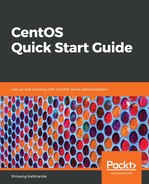These are the repositories that are not managed by the official CentOS community. Sometimes, we need to add them to our YUM database of repositories to download and install certain software, which is not available in CentOS official repositories. However, if these are added, they should be managed separately to prevent any unintended or conflicting updates from them.
The following is a list of certain repositories that have certain additional CentOS packages that are not available in the CentOS base or updates repository:
- Extra Packages for the Enterprise Linux (EPEL) repository: This repository is maintained by the Fedora community and is one of the most trusted third-party repositories that can be added in your system. We can add this repository to our system with the following command:
$ yum install epel-release -y
- Community Enterprise Linux Repository (ELRepo): This is an Enterprise Linux repository that provides hardware-related RPM packages. It includes filesystem drivers, graphics, sound, webcam, video, and network drivers, and the latest kernel packages. We can add this repository to our system with the following command:

- Nux-desktop repository: This repository provides desktop and multimedia-related packages for Enterprise Linux. Some popular multimedia software such as VLC media player, mplayer, and so on are available through this repository. Some of the packages in this repository have some dependencies that are resolved with the EPEL repository. At the same time, it is strongly recommended not to use this repository with RPMForge or the ATRPMS repository as it may lead to conflict between packages and dependencies. Also, RPMForge is a dead project and is not being maintained. We can add the Nux-desktop repository to our system with the following command:
$ yum install epel-release
$ rpm -Uvh
http://li.nux.ro/download/nux/dextop/el7/x86_64/nux-dextop-release-0-5.el7.nux.noarch.rpm
- Remi repository: This is a third-party repository, mainly famous for providing the latest versions of the PHP stack, MySQL, and related software used in Enterprise Linux. It also requires the EPEL repository to be installed on CentOS before installing it. We can push the remi repository to our system with the following commands:
$ yum install epel-release
$ rpm -Uvh https://rpms.remirepo.net/enterprise/remi-release-7.rpm
The remi repository is not enabled by default on installation. To install packages using this repository, we need to first enable it.
- RPM fusion repository: This third-party repository offers some free and non-free add-on packages that the Fedora project or Red Hat do not want to share with Enterprise Linux. We can add this repository to our system with the following command:
$ rpm -Uvh https://download1.rpmfusion.org/free/el/rpmfusion-free-release-7.noarch.rpm
There are many third-party repositories available; some of them are not maintained, whereas some of them have conflicting packages. For more information about repositories, such as which repositories should be avoided and which are recommended, you can go to the following wiki page of CentOS:
https://wiki.centos.org/AdditionalResources/Repositories.
https://wiki.centos.org/AdditionalResources/Repositories.
